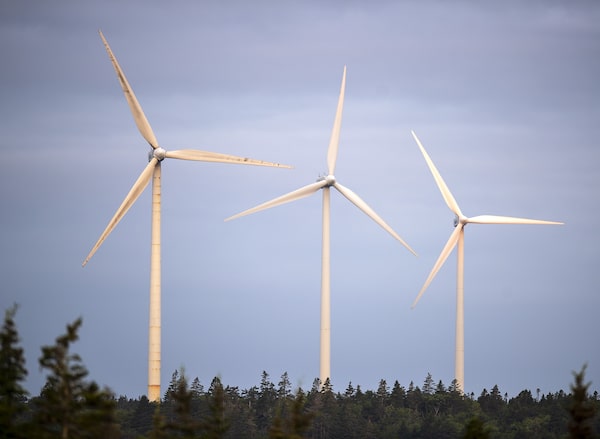
The West Pubnico Point Wind Farm in Lower West Pubnico, N.S., in August 2021.Andrew Vaughan/The Canadian Press
Algonquin Power & Utilities Corp. said on Friday it agreed to sell its renewable energy business for up to US$2.5-billion in a quest to pay down debt and restructure into a pure-play regulated utility company.
Oakville, Ont.-based Algonquin also cut its dividend by 40 per cent, to 6.5 US cents a share, contributing to a 12.6-per-cent drop in the stock Friday.
The company, which had signalled it was looking to offload its wind and solar business, said New York-based LS Power will pay US$2.28-billion in cash, plus a potential US$220-million more if some wind-power assets meet financial targets in the future.
The assets include non-regulated renewable and clean-power units in Canada and the United States. Algonquin’s hydroelectric assets are not part of the sale to LS Power, a private company that has developed, acquired and managed 47,000 megawatts of power generation and more than 1,250 kilometres of transmission lines.
Algonquin, a one-time market darling that has been pressured by a failed U.S. acquisition attempt, high debt and unfavorable changes to U.S. tax credits, also said it will reduce its capital spending budget. That and the dividend cut are aimed at bolstering the company’s balance sheet, it said.
“We’re implementing fundamental changes to how we operate the company with increased accountability,” Christopher Huskilson, Algonquin’s chief executive officer, said in a conference call. “This is the beginning of a multiyear journey to unlock the value of our regulated business.”
The stock sank $1.07 to $7.42 on the Toronto Stock Exchange on Friday, its lowest since last November. Algonquin shares were worth more than $22.50 at their peak in early 2021.
The sale comes after tumultuous time at the company. Mr. Huskilson became permanent CEO in May after taking on the role on an interim basis when former chief Arun Banskota left the company a year ago. Algonquin had recently launched a strategic review of its renewables division.
In 2023, activist investor Starboard Value LP bought a stake in Algonquin and pushed for a sale, saying proceeds could be used to winnow down the company’s debt load and increase earnings.
In March this year, Starboard, which had increased its interest to more than 8 per cent, said it would seek to replace three directors to bring in fresh leadership. The two sides eventually agreed to a truce, with Algonquin nominating two of the U.S. fund’s picks to the board.
When the sale is completed late this year or in early 2025, Algonquin will concentrate on its regulated power, gas and water utility and its transmission operations. The business has assets worth about US$18-billion located mostly in Canada and the U.S.
Algonquin aims to use proceeds to reduce long-term debt, which totalled US$8.3-billion at the end of June, it said.
Executives did not rule out future share buybacks, but said they are not a current priority given the focus on debt reduction. Nelson Ng, analyst at Royal Bank of Canada, said investors would be disappointed by the lack of focus on shareholder returns.
Many had hoped there would be enough sale proceeds after debt reduction to devote to buybacks, Mr. Ng said in a note to clients. “We previously thought the company would buy back close to $900 million of shares,” he said.
Not all of the company’s past investments in that business are reflected yet in the rates it is able to charge customers, Mr. Huskilson said. As much as US$1-billion of assets are “not receiving optimized regulatory treatment,” he said. That has led to the decision to reduce capital expenditures this year.
“These delays will, of course, impact short-term earnings. While we have some challenges in the short term, the substantial value here is a disciplined capital-light trajectory to improve returns,” he said.
Algonquin also reported its second-quarter results on Friday. Net earnings were US$200.8-million, or 28 US cents a share, up from a year-earlier net loss of US$253.2-million, or 37 US cents a share.
Revenue was US$598.6-million, down 5 per cent from US$627.9-million in the second quarter of 2023. Revenue from the regulated services division fell 8 per cent to US$505.2-million.